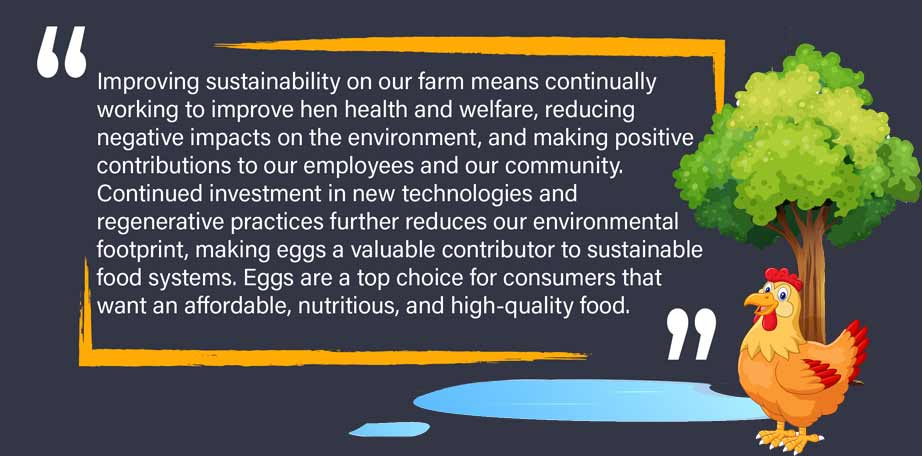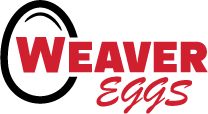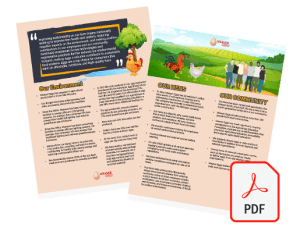SUSTAINABILITY

Our Hens
- To date, Weaver Eggs has demolished 1 million hens worth of conventional housing and is undergoing construction of cage-free barns. The company has recently completed its fourth cage-free barn, with the fifth barn currently under construction.
- Our hens are raised in safe, comfortable barns that protect them from disease, extreme weather, and predators. All hens receive a continuous supply of fresh food and water.
- We provide continuous training for employees on animal welfare best practices.
- Routine internal and external animal welfare auditing.
- On-site USDA graders and various agencies regularly perform audits and inspect compliance with local, state, and federal regulations.
- We have dedicated food safety and animal welfare compliance managers on-site at all times.
- Our farms also enforce strict biosecurity measures to prevent disease from entering our flocks. Some of these measures include: a strict shower-in/shower-out policy, vehicle sanitization, use of company-provided clothing and footwear, and frequent monitoring of flocks by poultry veterinarians.
Our Community
- Our farm has been owned and operated by the Weaver family since 1929. We are proud to be a fourth-generation family farm in our community.
- Weaver Eggs proudly employs more than 350 people from local communities.
- Weaver Eggs has made significant, ongoing contributions to the Agriculture Education Foundation, a private non-profit foundation that promotes agricultural education accessibility and supports agricultural educators.
- We regularly donate eggs to state and local food banks in addition to local, regional, and national organizations.
- During times of national catastrophic events, such as hurricanes, we send our trucks to deliver eggs to on-site disaster relief organizations.
- Weaver Eggs makes charitable contributions to build and improve our local community.
Our Environment
- Weaver Eggs has engaged in agricultural production for more than 90 years.
- Our footprint includes pullet growing, feed mills, processing and production facilities.
- Since the 1980s, Weavers has been converting facilities to energy efficient LED lighting systems. On average, this consumes 10% less energy than traditional lighting and reduces greenhouse gas emissions.
- Since the 1990s, Weavers has been converting facilities to energy efficient lighting systems. On average, this consumes 10% less energy than traditional lighting and reduces greenhouse gas emissions.
- Manure from our laying hens is recycled into crop production, providing nutrients for plants, contributing to healthy soils, saving energy, and reducing commercial fertilizer use.
- We domestically source 100% of the soybean meal and corn purchased to manufacture feed.
- A 2010 life cycle analysis of U.S. egg production (conducted by the American Egg Board) showed that the U.S. population has increased 72% over the past 50 years, but efficiencies in egg production have enabled U.S. egg farmers to meet demands of the growing population with just 18% more hens. Additional findings include:
-
- The egg production process releases significantly less polluting emissions, including 71% lower greenhouse gas emissions.
- Hens now use 32% less water per dozen eggs produced.
- Today’s hens use little over half the amount of feed to produce a dozen eggs.
- At the same time, today’s hens produce 27% more eggs per day and are living longer.
- We have made a commitment to using environmentally safe packaging and packaging materials. For example, we often use 100% recycled corrugated boxes. We also use molded pulp egg cartons that contain recycled paper, and polystyrene (foam) egg cartons that contain recycled material.
- The egg production process releases significantly less polluting emissions, including 71% lower greenhouse gas emissions.

